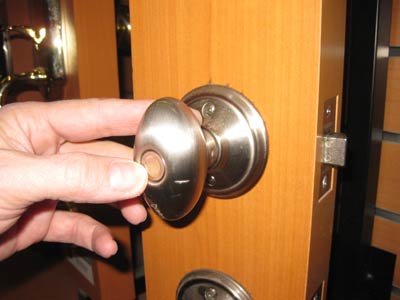
Every so often, somebody proudly tells me, “Things are so peaceful around here; we don’t even lock our doors!” I don’t understand why it seems to be a matter of pride to not secure one’s home and car. On the surface, the idea seems so pastoral and idyllic. But news stories and plain ol’ reality certainly call some of this idealism — and naiveté — into question.
I’m not an alarmist, but it’s no secret that home invasions often involve unlocked doors. Stories of stolen cars end up coming down to keys dangling invitingly in the ignition. Read any police blotter column in a local paper and the scenario is played out over and over.
No, this is not a tirade about crime or the poor miscreants who steal from or hurt others. It is also not intended to scare, intimidate or diminish the rural splendor that many of us came here to enjoy. But it does point to the undeniable fact that (to put it politely), “stuff happens.” And there’s my point: Why do some of us fly in the face of indisputable evidence by placing our loved ones and possessions in jeopardy by leaving our doors and cars unlocked? Why do so many people insist on inviting trouble quite literally onto their doorstep?
Most people who do these things don’t intentionally want trouble. They’re seeking the illusion of comfort; the falsely idealized notion that they live in a world where something bad “can’t happen to me.” It imparts a mistaken sense of power and security (like the seventh martini for the alcoholic, or the thrill of potential payoff for the compulsive gambler) to leave one’s door open against all odds. I can certainly understand the desire to feel triumphant, alive and in charge of one’s destiny. Indeed, who wouldn’t want to live in a neighborhood where you never had to worry about security? But sadly, wishing for something doesn’t make it so. To me, it makes more sense to let go of the unrealistic dreams so you can be safe enough to enjoy the realistic ones.
Adolescents and teenagers are prone to the “it can’t happen to me” psychology, and they often do unwise things. But their youthful sense of immortality doesn’t stand up to the facts. It’s really no different from adults who make unsound decisions based on nothing more than wishful thinking. There’s a psychological defense mechanism — a mental barrier, so to speak — between objective reality and the perception that life requires caution.
Caution isn’t fear, and it doesn’t mean living your life in constant avoidance of danger. It means understanding that certain behaviors don’t make sense, and then accepting that fact so life can be enjoyed with as little interference as possible.
A neurotically fearful person is reluctant to do anything because of “what might happen.” A healthy person assumes he can do many things, but takes a look at reality before forging ahead. A good example is the airline pilot doing pre-flight checks. There’s nothing neurotically fearful about this. It’s eminently sensible. That checklist is a metaphor for life: Fly as high and as far as you can, but first make sure everything’s in working order.
Some people find it unsettling to let go of the personal myth that “it can’t happen to me.” They feel like they’re losing something. The man who refuses to lock his door, or the teenager who doesn’t see a problem with reckless driving, both want to live life fully rather than be depressed. And good for them. But operating on the unspoken premise that “it can’t happen to me” is a surefire recipe not only for depression, but also any number of unhappy consequences.
You don’t have to spend all your time worrying about what could be just around the corner. You simply have to take responsibility for living in reality so you can stop worrying and get on with your life. A wise saying advises, “Hope for the best, but prepare for the worst.” I like mine even better: “Prepare for the worst, so you can live life at its best.”
Be sure to “friend” Dr. Hurd on Facebook. Search under “Michael Hurd” (Rehoboth Beach DE). Get up-to-the-minute postings, recommended articles and links, and engage in back-and-forth discussion with Dr. Hurd on topics of interest. Also follow Dr. Hurd on Twitter at @MichaelJHurd1
